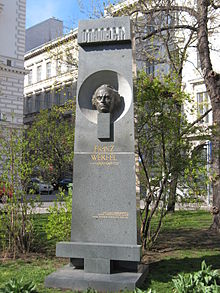Franz Werfel
Like the children of other progressive German-speaking Jews in Prague, Werfel was educated at a Catholic school run by the Piarists, a teaching order that allowed for a rabbi to instruct Jewish students for their Bar Mitzvahs.
[1] This, along with his governess's influence, gave Werfel an early interest (and expertise) in Catholicism, which soon branched out to other faiths, including Theosophy and Islam, such that his fiction, as well as his nonfiction, provides some insight into comparative religion.
Werfel began writing at an early age and, by 1911, had published his first book of poems, Der Weltfreund, which can be translated as "the friend to the world" as well as philanthropist, humanitarian, and the like.
While he lived in Germany, Werfel's milieu grew to include Else Lasker-Schüler, Martin Buber, Rainer Maria Rilke, among other German-language writers, poets, and intellectuals in the first decades of the twentieth century.
His duties both exposed him to the vicissitudes of total war as well as provided him with enough of a haven to continue writing Expressionist poems, ambitious plays, and letters voluminously.
His bias for Christian subjects, as well as his antipathy for Zionism, eventually alienated many of his Jewish friends and readers, including early champions such as Karl Kraus.
and wrote of Werfel in his prefatory remark: Since I was first moved by his poems, I have opened (knowing well, I should say, it's a problem) the gates of my invisible garden [i.e., an imaginarium] to him, and now he can do nothing for all eternity that would bring me to banish him from it.
[3]In the summer of 1917, Werfel left the frontline for the Military Press Bureau in Vienna, where he joined other notable Austrian writers serving as propagandists, among them Robert Musil, Rilke, Hugo von Hofmannsthal, and Franz Blei.
After the German invasion and occupation of France during World War II, and the deportation of French Jews to the Nazi concentration camps, Werfel had to flee again.
With the assistance of Varian Fry and the Emergency Rescue Committee in Marseille, he and his wife narrowly escaped the Nazi regime,[1] finding shelter for five weeks in the pilgrimage town of Lourdes.
[8] Werfel and his family settled in Los Angeles, where they met other German and Austrian emigrants, such as Mann, Reinhardt, and Erich Wolfgang Korngold.


